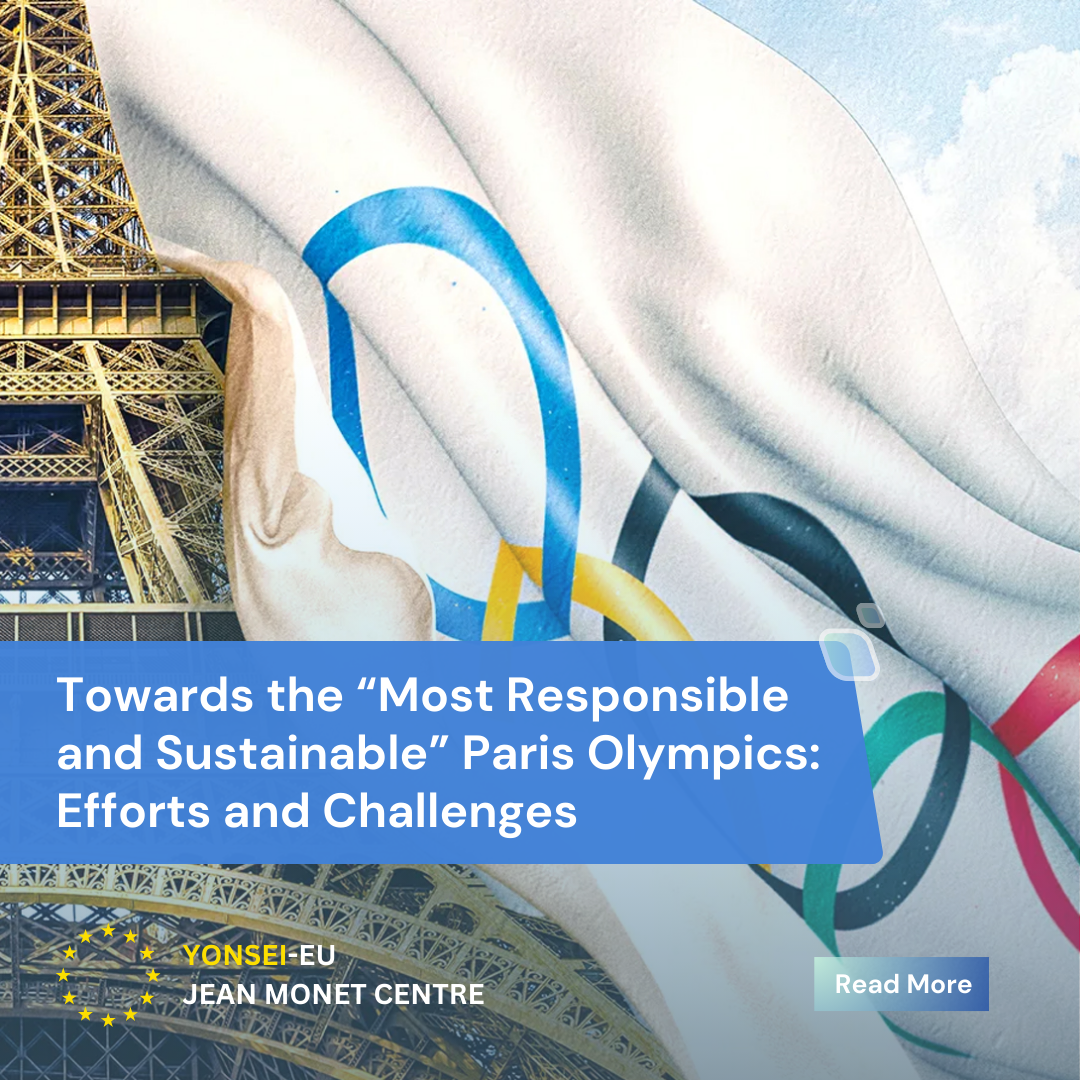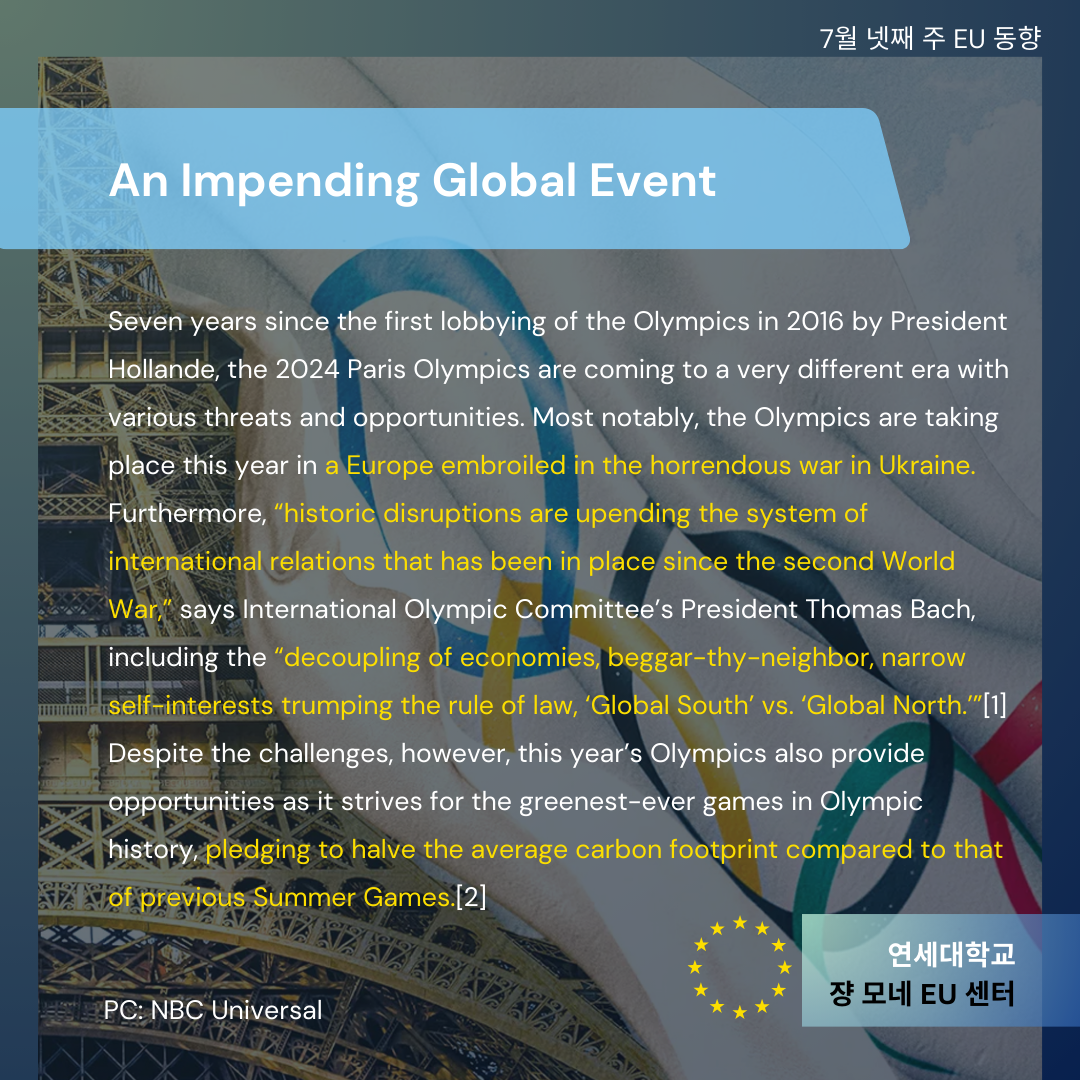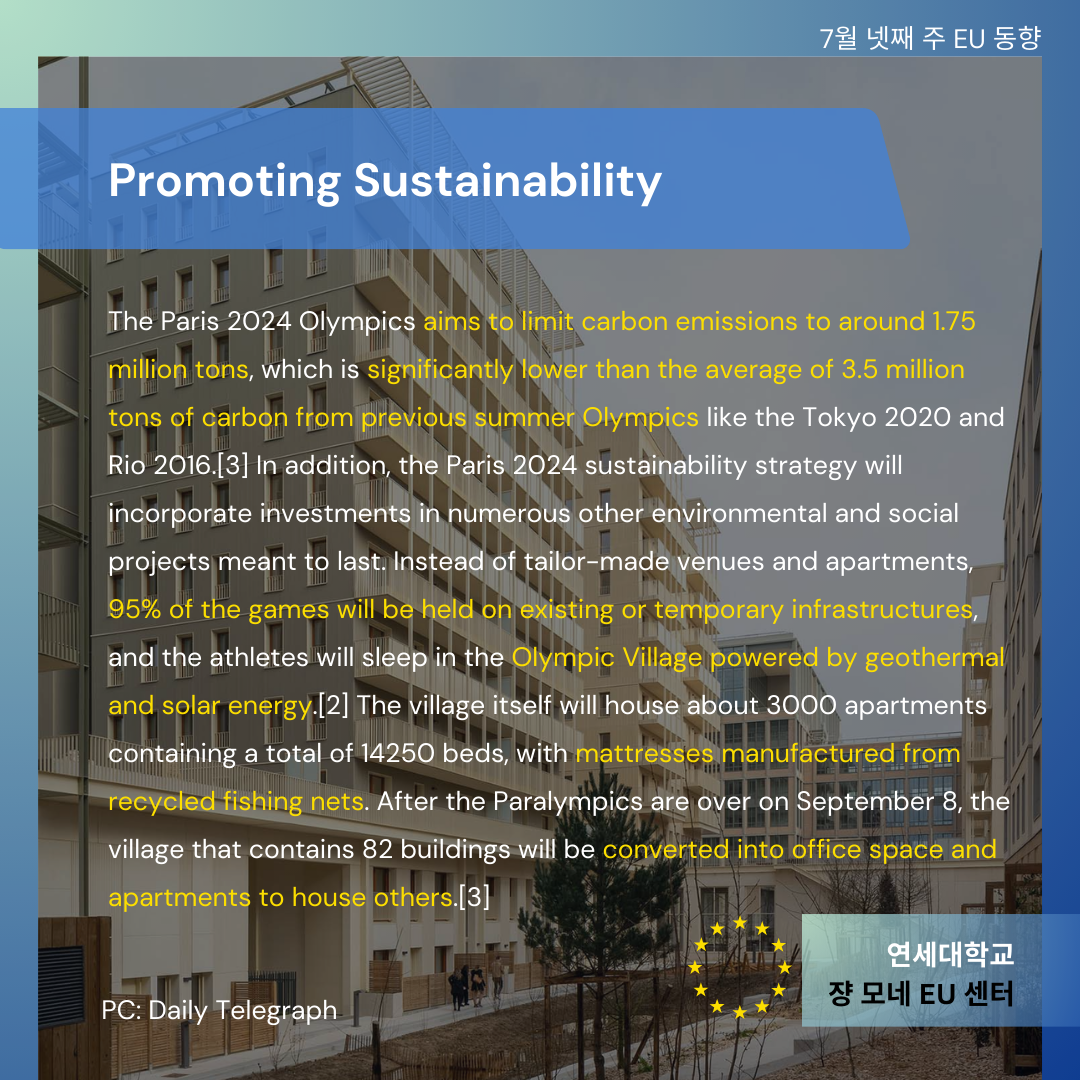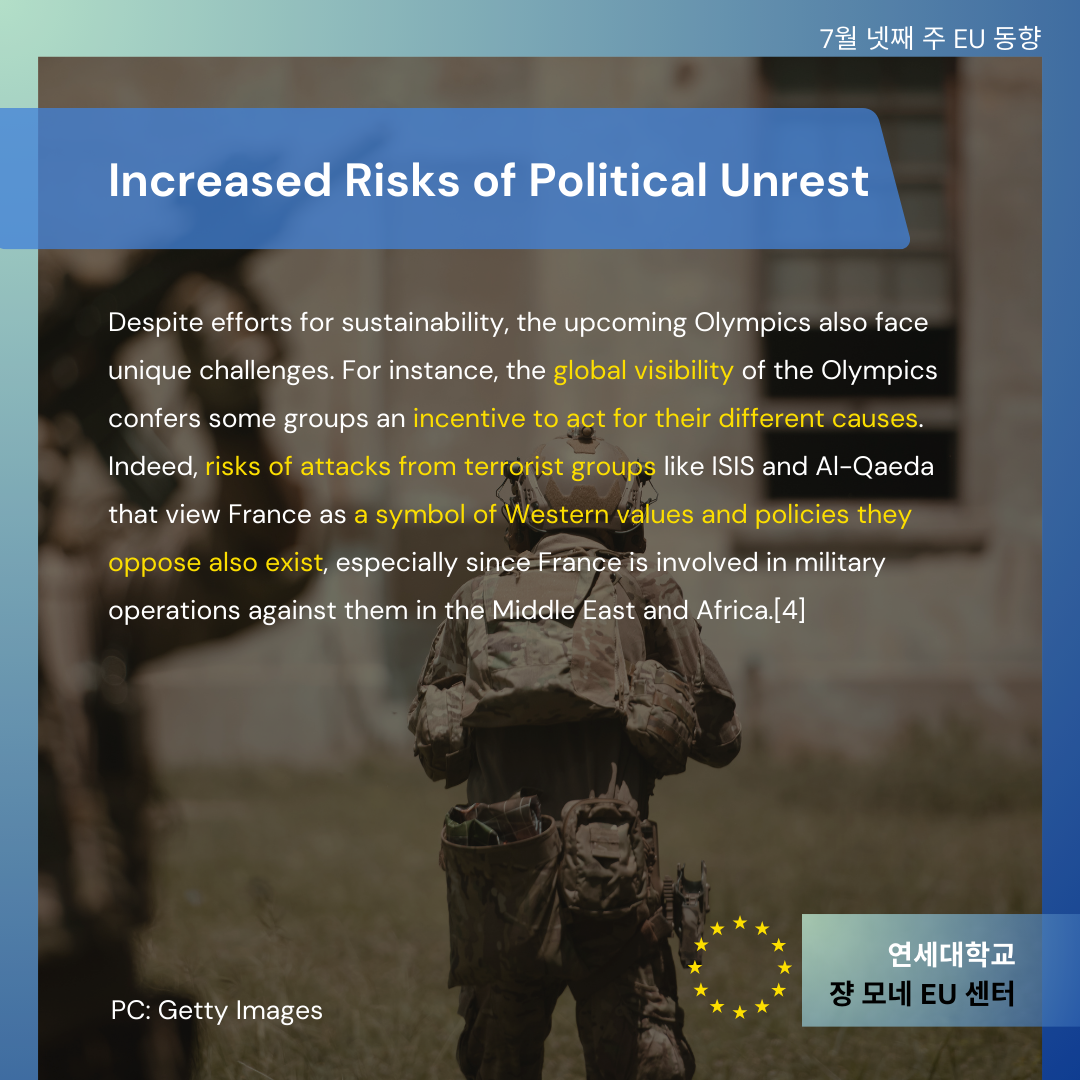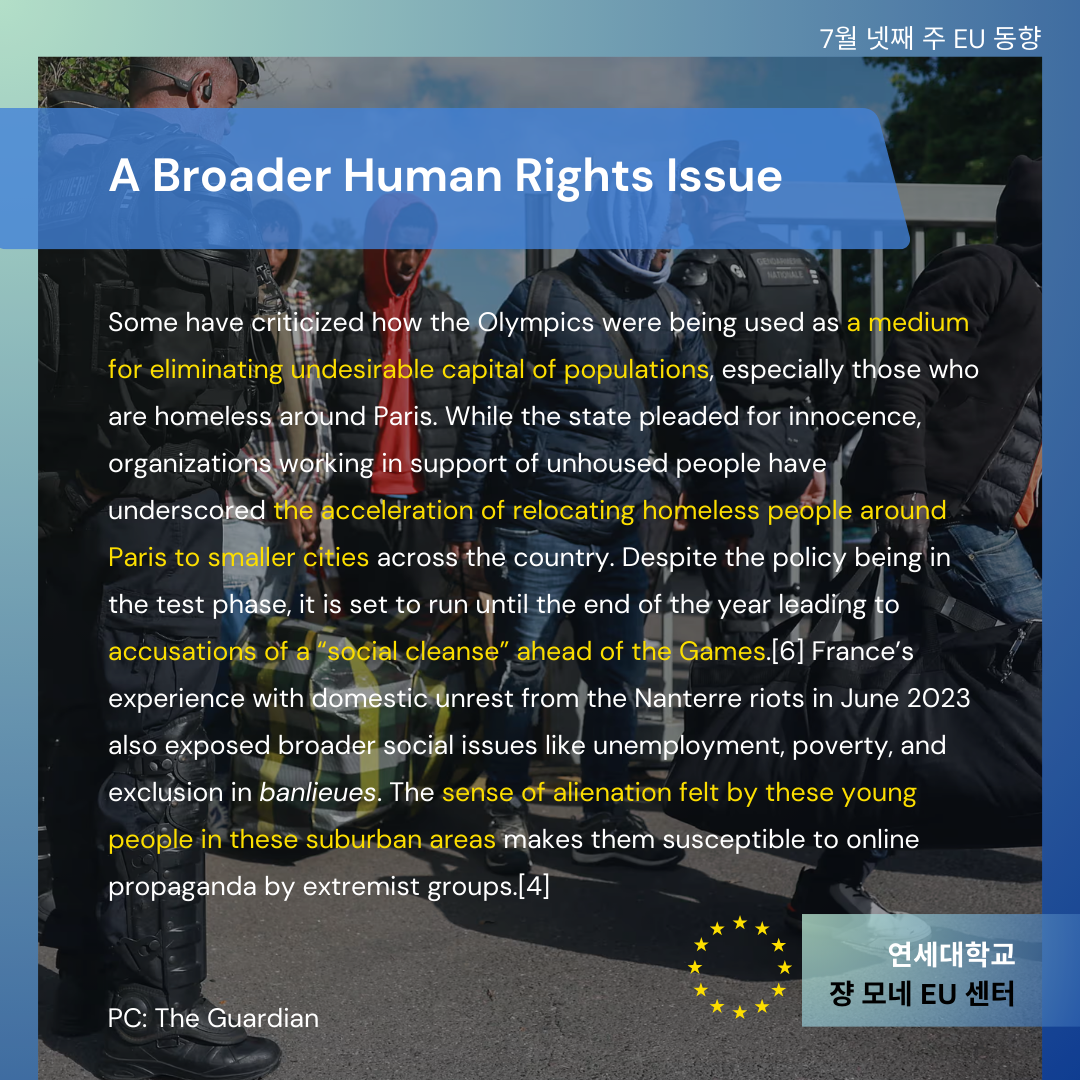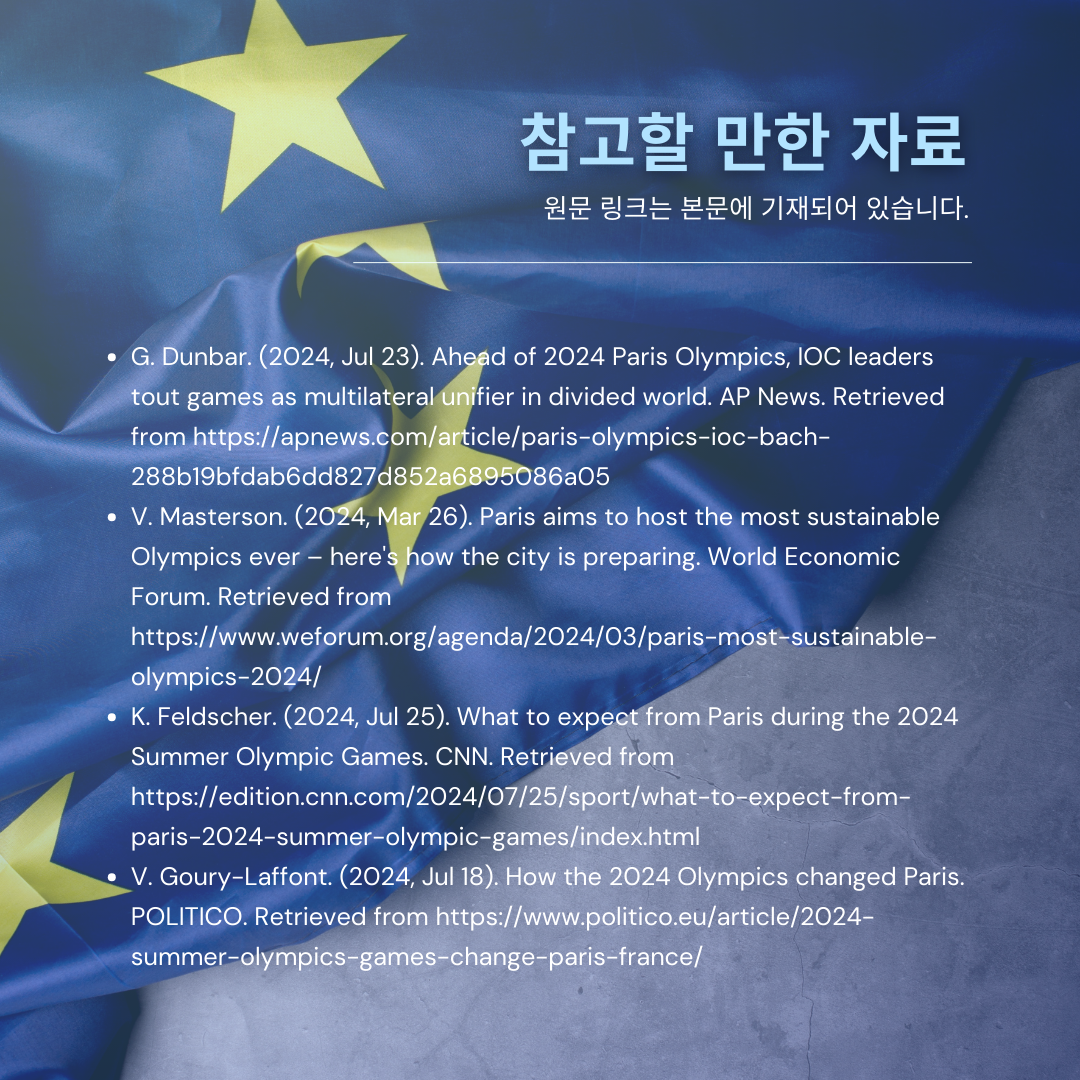YONSEI-EU Jean Monnet Centre
EU와 ASIA를 연결하는 네트워크 허브
EU 동향
EU 관련 최신 현안 이슈 및 동향을 분석하고 시사점을 제시합니다.
Towards the “Most Responsible and Sustainable” Paris Olympics: Efforts and Challenges
Seven years since the first lobbying of the Olympics in 2016 by President Hollande, the 2024 Paris Olympics are coming to a very different era with various threats and opportunities. Most notably, the Olympics, originally meant to represent peace and truce from war, are taking place this year in a Europe embroiled in the horrendous war in Ukraine. Furthermore, “historic disruptions are upending the system of international relations that has been in place since the second World War,” according to International Olympic Committee’s President Thomas Bach. Alongside the continued threats from terrorism, the negative trends have been clear: “decoupling of economies, beggar-thy-neighbor, narrow self-interests trumping the rule of law, ‘Global South’ vs. ‘Global North.’”[1] Despite the challenges, however, this year’s Olympics also provide opportunities in the field of sustainable development, as it strives for the greenest-ever games in Olympic history, pledging to halve the average carbon footprint compared to that of previous Summer Games.[2] As the global event pushes closer to the date, it is upon international attention whether it could overcome various security hurdles and serve as a new opportunity to foster inclusivity and build resilience for future games.
Promoting Sustainability
The Paris 2024 Olympics are described as the greenest and “the most sustainable” in history, aiming to limit carbon emissions to around 1.75 million tons and run on 100% renewable energy. This is significantly lower than the average of 3.5 million tons of carbon from previous summer Olympics like the Tokyo 2020, Rio 2016, and London 2012.[3] In addition to avoiding and reducing emissions, the Paris 2024 sustainability strategy will incorporate offsets, investing in numerous other environmental and social projects meant to last. Instead of tailor-made venues and apartments, 95% of the games will be held on existing or temporary infrastructures, and the athletes will sleep in the Olympic Village powered by geothermal and solar energy.[2] The village itself will house about 3000 apartments containing a total of 14250 beds, with mattresses manufactured from recycled fishing nets. It will also incorporate rooftops with enclosures and openings, as well as approximately 9,000 trees around the village, to attract and house different species of birds and insects. After the Paralympics are over on September 8, the village that contains 82 buildings will be converted into office space and apartments to house others.[3]
Increased Risks of Political Unrest
Despite efforts for sustainable development, the upcoming Olympics also face unique challenges. For instance, the global visibility of the Olympics confers some groups an incentive to act for their different causes. Indeed, risks of attacks from terrorist groups like ISIS and Al-Qaeda that view France as a symbol of Western values and policies they oppose also exist, since France is involved in military operations against them in the Middle East and Africa.[4] Paris’s history with terrorism further elevates these risks during the Olympics: the January 2015 Charlie Hebdo attacks and the November 2015 attacks on a football stadium exposed French security infrastructure’s vulnerability whilst highlighting the ease at which terrorists could strike at the heart of French society. Worse, the recent snap elections for parliament that deepen the left vs. far-right battle and conflicts in Ukraine and Gaza that lead to street protests over invitations of certain country’s athletes further deteriorate the already dire current global political climate.[5]
Human Rights Issue in the Broader Light
Some have criticized how the Olympics were being used as a medium for eliminating undesirable capital of populations, especially those who are homeless around Paris. While the state pleaded for innocence, organizations working in support of unhoused people have underscored the acceleration of relocating homeless people around Paris to smaller cities across the country. Despite the policy being in the test phase, it is set to run until the end of the year leading to accusations of a “social cleanse” ahead of the Games.[6] France has also experienced domestic unrest recently from the Nanterre riots in June 2023, which highlighted broader social issues such as unemployment, poverty, and exclusion in banlieues, suburban areas where youths may feel marginalized from mainstream society. The sense of alienation felt by these young people in banlieues makes them susceptible to online propaganda by extremist groups that often offer a sense of belonging and purpose in exchange for allegiance to radical causes. They may feel additionally disenfranchised during global events like the Olympics due to the increased potential of such digital indoctrination.[4]
Throughout the century, threats to multilateral cooperation have shaped global affairs. Among them, “narrow self-interest trumping the rule of law” seems to be the most influential today, according to Bach.[1] It is thus imperative for all nations to make collective efforts that go beyond their spheres to alter market dynamics, especially amid the Olympics where potent for significant international changes exists. With sustainable efforts framed around reduction and circulation, the world may be able to “move the dial on climate change mitigation,” says the World Economic Forum in its Global Risks Report 2024.[2] Furthermore, a comprehensive framework on politics and socioeconomics not only during but also after the Olympics may serve as a pivotal factor in making a difference in the decades coming forth.

[1] G. Dunbar. (2024, Jul 23). Ahead of 2024 Paris Olympics, IOC leaders tout games as multilateral unifier in divided world. AP News. Retrieved from https://apnews.com/article/paris-olympics-ioc-bach-288b19bfdab6dd827d852a6895086a05
[2] V. Masterson. (2024, Mar 26). Paris aims to host the most sustainable Olympics ever – here's how the city is preparing. World Economic Forum. Retrieved from https://www.weforum.org/agenda/2024/03/paris-most-sustainable-olympics-2024/
[3] K. Feldscher. (2024, Jul 25). What to expect from Paris during the 2024 Summer Olympic Games. CNN. Retrieved from https://edition.cnn.com/2024/07/25/sport/what-to-expect-from-paris-2024-summer-olympic-games/index.html
[4] K. P. Alexander. (2024 May 29). CO24069 | Securing the Spectacle: The Multifaceted Security Challenges of the Paris 2024 Olympics. RSiS. Retrieved from https://www.rsis.edu.sg/rsis-publication/rsis/securing-the-spectacle-the-multifaceted-security-challenges-of-the-paris-2024-olympics/
[5] J. Keating. (2024, Jul 26). Arson attacks underscore the security and terror threats to the Paris Olympics. Vox. Retrieved from https://www.vox.com/olympics/362512/olympics-paris-isis-russia-terrorism-security
[6] V. Goury-Laffont. (2024, Jul 18). How the 2024 Olympics changed Paris. POLITICO. Retrieved from https://www.politico.eu/article/2024-summer-olympics-games-change-paris-france/
